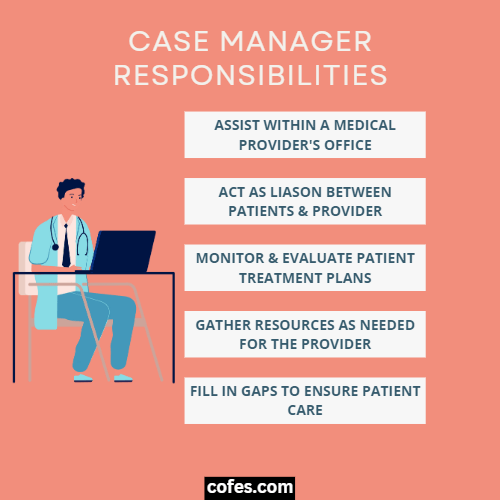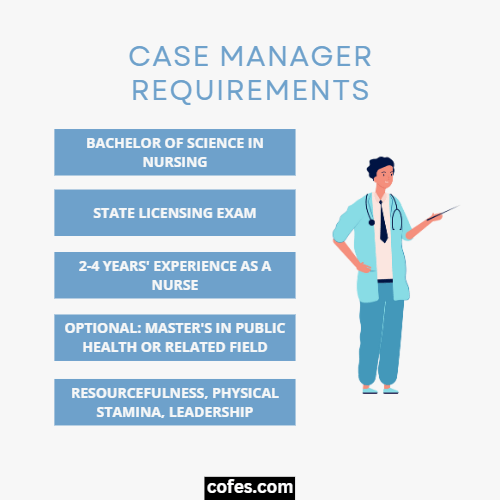A medical case manager works directly with medical patients to complete treatment plans, answer questions, gather essential information, and be a liaison with the medical provider.
Being a medical case manager is fulfilling if you like to help people, have a compassionate nature, and enjoy problem-solving to find solutions for patients and medical providers.
Most importantly, it can be hectic and emotional, and you have the opportunity to relate to patients and help them understand how the medical system can work for them.
Case Manager Job Information
| Official Job Title | Case Manager |
| Average Salary | $48,917 |
| Stress Level | High |
| Work/ Life | Low |
| Job Satisfaction | Average |
| Career Advancement | Below Average |
Medical Case Manager Job Description
What Is A Medical Case Manager?
The medical case manager is a liaison between the medical provider’s office and other departments, patients, and insurance companies.
This patient-focused position acts as a customer service representative for the medical provider’s office.
As a medical case manager, there will be many opportunities to work with people.
What Does A Medical Case Manager Do On A Daily Basis?
A medical case manager’s daily activities involve many interpersonal interactions with doctors, nurses, patients, insurance companies, and other care facilities.
They do a lot of written communication and spend time in meetings and on phones.

Responsibilities, Duties & Roles Of A Medical Case Manager
The medical case manager can be responsible for duties and roles around a medical provider’s office.
First and foremost, they are responsible for monitoring, evaluating, and making suggestions for patient treatment plans.
Secondly, they help the medical team by keeping track of patient and provider needs to ensure patient care.
Medical Case Manager Salary
Average Salary
The average salary for a medical case manager is approximately $48,917.
This average consists of varying tenure, locations, and provider offices.
Assignment can make a big difference over time, though few case managers reach higher-end salaries.
Starting Salary
Starting salaries for medical case managers, on average, start around $38,564.
This considers multiple medical provider’s offices, meaning a hospital might have a larger starting salary than a small chiropractor’s office.
Senior Salary
The senior salary based on research around the United States showcases managers reaching $86,377.
This position has a wide range but a low ceiling.
How To Become A Medical Case Manager
The Entry Level: Certification, Training & Degree
Many case managers are registered nurses.
To become a registered nurse, you need a Bachelor of Science in Nursing and then pass a state-specific exam to practice.
This is the regular training that most medical case managers complete.
However, some go on to get master’s degrees or come from other similar fields.
Other Skill Sets, Requirements & Qualifications
Some other necessary skills or qualities that a medical case manager needs are collaborative nature, resourcefulness, approachability, kindness, and empathy.
These skills help them interact with all the parties they must work with to provide excellent care.
How Long Does It Take To Become A Medical Case Manager?
The medical case manager is a position that takes some time to gain the education and work experience to become a medical case manager.
In most instances, after school, they still have to work for several years to get the knowledge needed to become a case manager.

Is It Hard To Become A Medical Case Manager?
It is a difficult job to attain.
If the educational requirements don’t stop someone, then the work it takes to have the appropriate experience might.
There is a reality of significant burnout that can occur as a registered nurse and working in the medical field, which keeps people from attaining this role.
Medical Case Manager Career Paths
The Medical Case Manager Roadmap
After completing your formal education, a case manager still needs two to four years of experience as a nurse before entering this role.
Once in an entry-level position, they can work their way up at varying levels for the job, depending on where they work.
Projections For Growth In Medical Case Manager Jobs
Through 2031, projected growth in the United States is 12%, faster than average.
This is significant growth that will help make it easier to get into the position.
It may also reduce the needed experience and qualifications to become a medical case manager.
In Summary: Is Medical Case Manager A Good Career?
There is significant potential for the growth of the position and the different areas of medicine it can lead.
If you like working with people and finding ways to help them with their health, this is the place to be.
It can be high-stress and lead to many work hours, but it has some potential for a long-lasting career.
Working Conditions
Can A Medical Case Manager Work Remotely From Home?
Oddly enough, due to current medical conditions, there are opportunities to work remotely with the rising nature of telehealth appointments.
More and more case managers can take advantage of these situations and help provide a high level of care.
The likelihood that this will grow in the future is high.
How Many Hours Does A Medical Case Manager Work?
Typically, the medical case manager works 40 hours a week.
This can look a few different ways when it comes to schedule.
Some work five days a week at eight hours a day, while others work four days a week at ten hours a day.
The schedule in terms of specific days can vary a great deal too.
Can A Medical Case Manager Work Part-Time?
Like any job, there is an excellent potential for case managers to work part-time.
This is part of the reason that there will be such a high growth rate for the role as more people transition to part-time work as case managers.
What Are The Average Vacation Days Of A Medical Case Manager?
Average vacation days start at 14 days per year.
Depending on seniority and where you work, there is a potential for additional days off.
Some smaller offices may only offer standard days off, while larger clinics or hospitals give tenured staff more time off.
Alternative Careers & Similar Jobs to a Medical Case Manager
- Medical Records Technician
- Medical Office Administrator
- Medical Laboratory Technician
- Forensic Science Technician
- Radiologic Technologist
- Cardiovascular Technologist
- Physical Therapy Assistant
- Phlebotomist
- Pharmacy Assistant
- Dispatcher
- Financial Counselor
- Cardiovascular Technologist
- Chemical Dependency Counselor Assistant
- Mental Health Counselor
- Medical And Health Service Manager
Medical Case Manager Resume Tips
The best resumes focus on knowledge and experience with the various parts of medicine and how to care for people.
It is also essential to highlight clinical resources and how you have used them in the past to usher in treatment plans that helped the patients in your care.
Medical Case Manager Interview Questions
Here are a few questions to look out for when interviewing for a medical case manager position:
Q1: What specific interests do you have in case management?
Why it works: This is a stressful job where you deal with a lot of different people.
Employers need to know what will help you work through stress and interpersonal relationships.
It will also provide them with the best fit in their office.
Q2: Describe a time when you worked with members of a patient’s care team and saw success in the patient’s case.
Why it works: This helps them see what helps a candidate succeed while working with other providers who may be treating any patient.
It can be easy to point out our struggles, but it’s essential to know our successes.
Q3: Tell us about a time when your patient refused to complete your treatment plan.
Why it works: This question focuses on working with complex patients, especially patients who are keeping themselves from seeing improvement in their conditions.
This will help the employer know how you think outside the box and try to change things to help the patient.
Jobs Related To Medical Case Manager
- Registered Nurse
- Nurse Practitioner
- Social Worker
- Program Manager
- Therapist or Counselor
For HR Manager: Tips For Hiring A Medical Case Manager
Key Characteristics To Look For In A Medical Case Manager
There are three significant characteristics to look for in a medical case manager: organizational, time management, and decision-making or problem-solving skills.
Candidates can enter the role with these critical characteristics and help the practice function well.
Minimum Level Of Education & Experience
Almost all education minimums are four-year degrees.
Experience levels can vary.
If multiple positions are available, taking a less experienced candidate might be helpful for less turnover within the medical practice.
